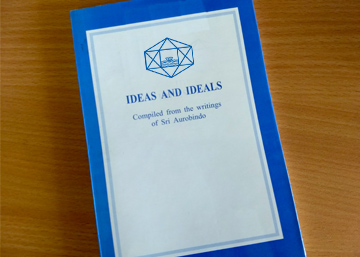Ideas and Ideals – A compilation from Sri Aurobindo’s writings
The title of the book is a little misleading because this book is not about philosophical abstractions on ideas and ideals. The topics presented in this compilation from Sri Aurobindo’s writing are on the issues and problems of contemporary life, for example, “Credits of Materialism”, “Business and Spirituality”, “Leadership in Politics”, “Small sized States”, “Statecraft”. Sri Aurobindo’s insights on the subject presents a balanced perspective on each topic.
Take for example the phenomenon of materialism. It is customary for spiritually inclined people to condemn materialism. But Sri Aurobindo brings out the positive contributions of scientific materialism to human progress, even while pointing out its limitations. Sri Aurobindo describes how materialism has “immensely widened the knowledge of the race and accustomed it to a great patience of research, scrupulosity, accuracy”. Similarly, with “Business and Spirituality”. Can these two domains of life which appears contradictory, come together? Sri Aurobindo answers in the affirmative and says that it is part of the gospel of the divine teacher in Bhagavad Gita.
On this aspect of Gita’s teachings, Sri Aurobindo states “that a man by doing in the right way and in the right spirit, the work dictated to him by his fundamental nature, temperament and capacity and according to his and its dharma, can march towards the Divine. It is in his view quite possible for a man to do business and make money and earn profit and be a spiritual man, practice yoga, have an inner life”
And again, can there be “Love in politics”, which looks much more contradictory than business and spirituality. “Love has a place in politics” says Sri Aurobindo. “But it is the love of one’s country, for one’s country men, for the glory, greatness and happiness of the race, the divine Ananda of self-immolation for one’s fellows, the ecstasy of relieving their suffering, the joy of seeing one’s blood flow for country and freedom, the bliss of union in death with fathers of the race”. On political leadership, Sri Aurobindo says “The authority of a political leader depends on his capacity to feel and express the sentiments of the people who follow him; it does not reside in himself. He holds his position because he is a representative man, not because he is such and such an individual. The moment he tries to misuse his position in order to impose his own will upon the people, instead of making their will his own, he forfeits all claim to respect”
As a whole, this slender compilation of Sri Aurobindo’s writing is insightful and inspiring which can help us to look at things in a deeper and wider perspective. There are two articles in the book – “Black money and Divine Cause” and the “Changing Values in Business” which are not from Sri Aurobindo’s writings but written by the compiler Dr. G.P. Gupta. But in a book which is a compilation from Sri Aurobindo’s writings, this kind of articles by others have to be put in the Appendix and should not be included in the main part of the book.

